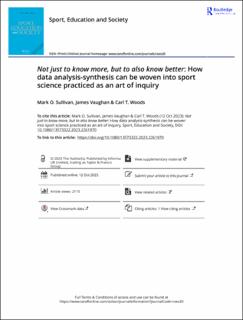| dc.contributor.author | O'Sullivan, Mark Joseph | |
| dc.contributor.author | Vaughan, James | |
| dc.contributor.author | Woods, Carl T. | |
| dc.date.accessioned | 2024-03-18T07:17:29Z | |
| dc.date.available | 2024-03-18T07:17:29Z | |
| dc.date.created | 2023-11-01T11:13:26Z | |
| dc.date.issued | 2023 | |
| dc.identifier.citation | Sport, Education and Society. 2023, Artikkel 2261970. | en_US |
| dc.identifier.issn | 1357-3322 | |
| dc.identifier.uri | https://hdl.handle.net/11250/3122764 | |
| dc.description | This is an Open Access article distributed under the terms of the Creative Commons Attribution License (http://creativecommons.org/licenses/by/4.0/), which permits unrestricted use, distribution, and reproduction in any medium, provided the original work is properly cited. The terms on which this article has been published allow the posting of the Accepted Manuscript in a repository by the author(s) or with their consent. | en_US |
| dc.description.abstract | Utilising novel ways of knowing, aligned with an ecological approach, the Learning in Development Research Framework (LDRF) has been introduced as a different way to guide research and practice in sport. A central feature of this framework is an appreciation of researcher embeddedness; positioned as an inhabitant who follows along with the unfolding inquiry. This positioning is integral for enriching ones understanding of the relations between socio-cultural constraints and affordances for skill learning within a sports organisation. Moreover, the notion of embeddedness foregrounds the ongoing nature of inquiry when practiced as an art of inquiry. In an effort to extend these ideas, this paper highlights how a phronetic iterative approach to data analysis-synthesis could be undertaken, while ensuring that the researcher remains ‘in touch’ with a phenomenon, and thus faithful to key tenets of research practiced as an art of inquiry. To illustrate this, we present a ‘walk-through’ from a recent LDRF study. Rather than focusing on data collection or recorded observations made from afar, this walk-through shows how a researcher, practicing an art of inquiry, can grow knowledge of and with the phenomena, enriching the evolution of practice and performance from within an ecology of relations. | en_US |
| dc.language.iso | eng | en_US |
| dc.subject | correspondence | en_US |
| dc.subject | data analysis | en_US |
| dc.subject | data synthesis | en_US |
| dc.subject | sport science | en_US |
| dc.subject | transdisciplinarity | en_US |
| dc.title | Not just to know more, but to also know better: How data analysis-synthesis can be woven into sport science practiced as an art of inquiry | en_US |
| dc.type | Peer reviewed | en_US |
| dc.type | Journal article | en_US |
| dc.description.version | publishedVersion | en_US |
| dc.rights.holder | © 2023 The Author(s) | en_US |
| dc.source.pagenumber | 19 | en_US |
| dc.source.journal | Sport, Education and Society | en_US |
| dc.identifier.doi | 10.1080/13573322.2023.2261970 | |
| dc.identifier.cristin | 2190967 | |
| dc.description.localcode | Institutt for idrett og samfunnsvitenskap / Department of Sport and Social Sciences | en_US |
| dc.source.articlenumber | 2261970 | en_US |
| cristin.ispublished | true | |
| cristin.fulltext | original | |
| cristin.qualitycode | 2 | |
